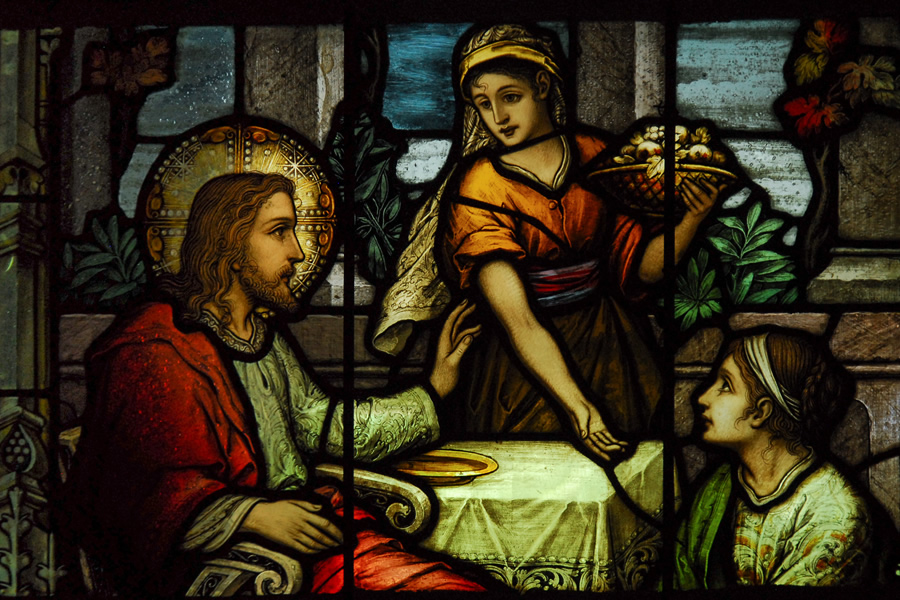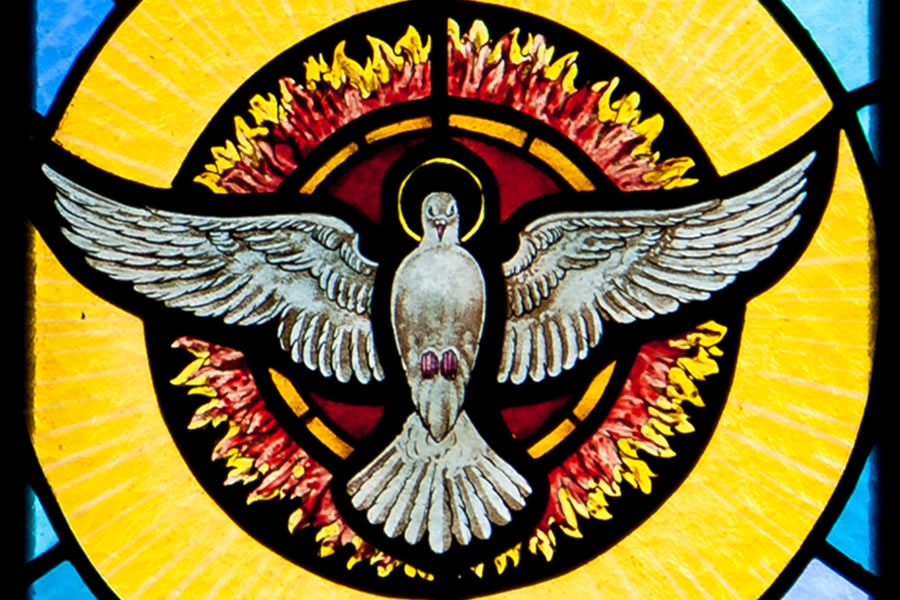St. Francis of Assisi Weekly Reflections
Seeking Balance
07-31-2022Question of the WeekReading I: Ecclesiastes 1:2; 2:21-23 - On vanity
Reading II: Col 3:1-5, 9-11 - Mystical death and resurrection
Gospel: Luke 12:13-21 - Trust in God, not in possessions
Key Passage: And Jesus said to them, “Take care! Be on your guard against all kinds of greed; for one's life does not consist in the abundance of possessions.” (Luke 12:15)
Adults: When have you felt that possessions were becoming too important in your life?
Kids: Have you ever received a gift you wanted a lot and then found it didn't make you as happy as you thought it would?
Buscando el Equilibrio
Lectura I: Eclesiastés 1:2; 2:21-23 - Sobre la vanidad
Lectura II: Col 3, 1-5, 9-11 - Muerte mística y resurrección
Evangelio: Lucas 12:13-21 - Confía en Dios, no en las posesiones
Pasaje Clave: Y Jesús les dijo: “Eviten toda clase de avaricia, porque la vida del hombre no depende de la abundancia de los bienes que posea.” (Lucas 12:15)
Adultos: ¿Cuándo has sentido que las posesiones se estaban volviendo demasiado importantes en tu vida?
Niños: ¿Alguna vez has recibido un regalo que deseabas mucho y luego te diste cuenta de que no te hacía tan feliz como pensabas?

"All Things are Vanity"
07-31-2022Weekly ReflectionWe Celebrate Worship Resource, Vol. 47, No. 3Jesus really does not want to get into the business of settling disputes between siblings. Two Sundays ago we heard Martha ask Jesus to tell her sister to share in the work of serving him. Today we hear someone ask him to tell his brother to share the family inheritance. Either time Jesus could have asked the siblings to share the family inheritance. Either time Jesus could have asked the siblings to share equally. But neither time does Jesus take the bait. His goal is not to determine fairness—remember, he told the parable of the prodigal son, who received much more that what was “fair” - but to reorient our perspective as to what truly is important in life. What good is it to have half of an inheritance if your life ends before you can spend even a penny? The person who spends all their time and energy fighting for more wealth, be it an inheritance or a bountiful harvest, is misguided. This is not what’s important in life, any more that who is doing all the chores. Things—like money, food and accomplishments—are vanity. “All things are vanity!” (Ecclesiates 1:2). To find what really matters it helps to recall last Sunday’s Gospel when Jesus taught his disciples to pray. He taught them to make holy God’s name, to pray for God’s kingdom, to do God’s will, and to forgive others. This is where our true treasure is found.
When do you lose sight of what’s important and try to store up earthly riches?
“Todas Las Cosas Son Vana Ilusión”
Jesús realmente no quiere meterse en el negocio de resolver disputas entre hermanos. Hace dos domingos atrás escuchamos a Marta pedirle a Jesús que le diga a su hermana que participe en el trabajo de servirlo. Hoy escuchamos a alguien pedirle que le diga a su hermano que comparta la herencia familiar. En cualquiera de estas dos ocasiones, Jesús podría haber pedido a los hermanos que compartieran por igual. Su objetivo no es determinar la equidad—recuerde, contó la parábola del hijo pródigo, que recibió mucho más de lo que era “justo”—sino reorientar nuestra perspectiva sobre lo que verdaderamente es importante en la vida. ¿De qué sirve tener la mitad de una herencia si tu vida termina antes de que puedas gastar ni un centavo? La persona que gasta todo su tiempo y energía luchando por más riqueza, ya sea una herencia o una cosecha abundante, está equivocada. Esto no es lo importante en la vida, como tampoco quién está haciendo todas las tareas del hogar. Las cosas, como el dinero, la comida y los logros, son vanidad. “Todas las cosas son vana ilusión.” (Eclesiastés 1:2). Para encontrar lo que realmente importa, ayuda recordar el Evangelio del domingo pasado cuando Jesús enseñó a sus discípulos a orar. Les enseñó a santificar el nombre de Dios, a orar por el reino de Dios, a hacer la voluntad de Dios y a perdonar a los demás. Aquí es donde se encuentra nuestro verdadero tesoro.¿Cuándo has perdido de vista lo que es importante y has tratado de acumular riquezas terrenales?
Daily Prayer
07-24-2022Question of the WeekReading I: Genesis 18:20-32 - Abraham intercedes for Sodom
Reading II: Colossians 2:12-14 - Sovereign role of Christ
Gospel: Luke 11:1-13 - The Our Father
Key Passage: Jesus said, “So I say to you, Ask, and it will be given you; search, and you will find; knock, and the door will be opened for you.” (Lk. 11:9)
Adults: Have your most recent prayers been prayers of praise, petition, or sorrow? Which kind of prayer do you need to practice more often?
Kids: What are you most thankful for right now?
Visitantes Santos
Lectura I: Génesis 18:20-32 - Abraham intercede por Sodoma
Lectura II: Colosenses 2:12-14 - Rol soberano de Cristo
Evangelio: Lucas 11:1-13 - El Padre Nuestro
Pasaje Clave: Jesús dijo: “Así también les digo a ustedes: Pidan y se les dará, busquen y encontrarán, toquen y se les abrirá.” (Lc. 11:9)
Adultos:¿Han sido tus oraciones más recientes oraciones de alabanza, petición o tristeza? ¿Qué tipo de oración necesitas practicar con más frecuencia?
Niños: ¿Por qué estás más agradecido en este momento?

We are Children of God
07-24-2022Weekly ReflectionWe Celebrate Worship Resource, Vol. 47, No. 3N ot only does Jesus teach his disciples how to pray, he teaches them why their prayer will be effective. His final paragraph explains it. Parents give their child gifts that are desired and appreciated. God is that parent to all of us. We are all children of God, after all, and so we are taught to call God our Father. Our Father has already given us Jesus Christ and the Holy Spirit, so we know how generous a parent God is, giving us all that we need and more than we could ever ask for. In teaching us to ask for bread daily, Jesus teaches us that God’s generosity is continual. This is important, for forgiveness of sins needs to be unceasing as well. When we in turn forgive one another’s sins, we are sharing God’s mercy. We are, in fact, bringing God’s kingdom to come in some small way. In the first reading, we see Abraham bargain with God when he asks that Sodom be saved if even just a handful of good people may be found there. God was willing to bargain with Abraham because they had a special relationship. We too have a special relationship with God: we are children of God.
What do you ask of God in prayer? How do you listen for God’s response?
Nosotros Somos Hijos de Dios
J esús no solo enseña a sus discípulos cómo orar, sino que les enseña por qué su oración será eficaz. Su último párrafo lo explica. Los padres dan a sus hijos regalos que son deseados y apreciados. Dios es ese padre para todos nosotros. Todos somos hijos de Dios, después de todo, y por eso se nos enseña a llamar a Dios nuestro Padre. Nuestro Padre ya nos ha dado a Jesucristo y al Espíritu Santo, así que sabemos cuán generoso es Dios como padre, dándonos todo lo que necesitamos y más de lo que podríamos pedir. Al enseñarnos a pedir pan cada día, Jesús nos enseña que la generosidad de Dios es continua. Esto es importante, porque el perdón de los pecados también debe ser incesante. Cuando a la vez nos perdonamos los pecados unos a otros, estamos compartiendo la misericordia de Dios. De hecho, estamos trayendo el reino de Dios para que venga de una manera pequeña. En la primera lectura, vemos a Abraham negociar con Dios cuando le pide que Sodoma se salve si se encuentra allí aunque sea un puñado de buenas personas. Dios estaba dispuesto a negociar con Abraham porque tenían una relación especial. Nosotros también tenemos una relación especial con Dios: somos hijos de Dios.
¿Qué le pides a Dios en oración? ¿Cómo escuchas la respuesta de Dios?
Holy Visitors
07-17-2022Question of the WeekReading I: Genesis 18:1-10a - Abraham's visitors
Reading II: Colossians 1:24-28 - The mystery: Christ in us
Gospel: Luke 10:38-42 - Martha and Mary
Key Passage Jesus said to Martha, “There is need of only one thing. Mary has chosen the better part, which will not be taken away from her.” (Lk. 10:42)
Adults: Which response to God's call is more natural to you—prayer or action? Why?
Kids: In the past week, when have you prayed and when have you done good things for others? Which could you do better?
Visitantes Santos
Lectura I: Génesis 18:1-10a - Los visitantes de Abraham
Lectura II: Colosenses 1:24-28 - El misterio: Cristo en nosotros
Evangelio: Lucas 10,38-42 - Marta y María
Pasaje Clave Jesús le dijo a Marta: “...muchas cosas te preocupan y te inquietan, siendo así que una sola es necesaria. Maria escogió la mejor parte y nadie se la quitará.” (Lc 10:42)
Adultos:¿Qué respuesta al llamado de Dios es más natural para ti: la oración o la acción? ¿Por qué?
Niños: En la última semana, ¿cuándo has orado y cuándo has hecho cosas buenas por los demás? ¿Cuál podrías hacer mejor?

The Better Part
07-17-2022Weekly ReflectionWe Celebrate Worship Resource, Vol. 47, No. 3To Martha has fallen the burden of doing all the work. We are told that she is doing all the serving. Presumably she is cooking and preparing the meal as well. When she appeals to Jesus for help from her sister, she expects him to take her side. But he avoids doing so. It may seem unsympathetic, but perhaps he is more concerned with teaching the lesson that is as important as the service she is providing, there is an even better way to serve their guest. While Martha is busy elsewhere, Mary is spending time with him. This is the reason for the hospitality Martha showed in the first place by inviting him into their home, the hospitality Abraham showed the stranger in the first reading. Mary is serving the Lord by simply being with him. Listening at his feet, she is likely enraptured by his talk of God’s kingdom. She soon becomes his disciple. This truly is “the better part” (Luke 10:42). Here, today, we are offered the better part. Like Mary, we can sit back, put aside our anxieties and worries, and become fully present to the Lord, listen to the word of God, share in the meal the Lord himself provides, and grow as his disciples.
How can your hospitality help you grow as a disciple?
"La Mejor Parte"
A Marta le ha tocado la carga de hacer todo el trabajo. Se nos dice que ella está haciendo todo el servicio. Presumiblemente, ella también está cocinando y preparando la cena. Cuando apela a Jesús para que la ayude con su hermana, espera que él se ponga de su parte. Pero él evita hacerlo. Puede parecer antipático, pero tal vez él esté más preocupado por enseñar la lección que es tan importante como el servicio que está brindando, hay una manera aún mejor de atender a su invitado que ella. Mientras Marta está ocupada en otra parte, María pasa tiempo con él. Esta es la razón de la hospitalidad que Marta mostró en primer lugar al invitarlo a su casa, la hospitalidad que Abraham mostró al extraño en la primera lectura. María está sirviendo al Señor simplemente estando con él. Al escuchar a sus pies, es probable que esté embelesada por su charla sobre el reino de Dios. Pronto se convierte en su discípula. Esto verdaderamente es “la mejor parte” (Lucas 10:42). Aquí, hoy, nos ofrece la mejor parte. Como María, podemos recostarnos, dejar de lado nuestras ansiedades y preocupaciones, y estar plenamente presentes en el Señor, escuchar la palabra de Dios, compartir la comida que el mismo Señor provee y crecer como sus discípulos.
¿Cómo puede tu hospitalidad ayudarte a crecer como discípulo?

The Good Samaritan
07-10-2022Weekly ReflectionWe Celebrate Worship Resource, Vol. 47, No. 3Samaritans were the enemy. For centuries they had been despised and scorned by the people of Judea. They certainly were not welcomed on the road from Jerusalem to Jericho. It wouldn’t take long to find an analogue in our divided country today, with two camps opposed to each other on nearly every substantial issue over the last few years. Think of someone whom you disagree with in every way coming to help a friend in your circle who has been attacked and left for dead. This is likely how this scholar of the law imagined the parable he heard Jesus tell. His “allies” had refused to help the victim while his “enemy” treated him with mercy. Who knows? The victim could have been a priest or Levite himself. He could have been a scholar of the law. He could have been him. And it was a Samaritan—a man he’d labeled as unfeeling and uncaring—who saved him. Jesus the Teacher teaches us to look past preconceptions, past stereotypes, and realize that it may be the person we least expect who is truly caring and merciful.
Who is a Samaritan in your world? How can you come to see those you strongly disagree with as potential “good Samaritan”?
El Buen Samaritano
Los samaritanos eran el enemigo. Por siglos habían sido despreciados y rechazados por la gente de Judea. Ciertamente no fueron bienvenidos en el camino de Jerusalén a Jericó. Hoy día, no nos llevaría mucho tiempo encontrar un análogo en nuestro país dividido, con dos campos opuestos entre sí en casi todos los temas importantes en los últimos años. Piensa en alguien con quien no estás de acuerdo en todos los sentidos que viene a ayudar a un amigo de tu círculo que ha sido atacado y dado por muerto. Probablemente así es como este estudioso de la ley imaginó la parábola que escuchó contar a Jesús. Sus “aliados” se habían negado a ayudar a la víctima mientras que su “enemigo” lo trataba con misericordia. ¿Quién sabe? La víctima podría haber sido un sacerdote o un levita mismo. Podría haber sido un estudioso de la ley. Podría haber sido él. Y fue un samaritano, un hombre al que había etiquetado como insensible e indiferente, quien lo salvó. Jesús, el Maestro, nos enseña a mirar más allá de las ideas preconcebidas, los estereotipos y darnos cuenta de que puede ser la persona que menos esperamos la que es verdaderamente solidaria y misericordiosa.
¿Quién es un samaritano en tu mundo? ¿Cómo puedes llegar a ver a aquellos con los que no estás de acuerdo como posibles “buenos samaritanos”?
Acting with Mercy
07-10-2022Question of the WeekReading I: Deuteronomy 30:10-14 - God's command clear
Reading II:Colossians 1:15-20 - Christ's fullness and reconciliation
Gospel: Luke 10:25-37 - The good Samaritan
Key Passage: But a Samaritan, while traveling, came near him; and when he saw him, he was moved with pity. He went to him and bandaged his wounds, having poured oil and wine on them. Then he put him on his own animal, brought him to an inn, and took care of him. (Lk. 10:33–34)
Adults: When have you gone out of your way to help a stranger in need?
Kids: Would you help a new student who needed help? Why or why not?
Actuando con Misericordia
Lectura I: Deuteronomio 30,10-14 - El mandato de Dios claro
Lectura II: Colosenses 1:15-20 - La plenitud y la reconciliación de Cristo
Evangelio: Lucas 10:25-37 - El buen samaritano
Pasaje Clave: Pero un samaritano que iba de viaje, al verlo, se compadeció de él, se le acerco, ungió sus heridas con aceite y vino y se las vendó; luego lo puso sobre su cabalgadura, lo llevo a un mesón y cuido de él. (Lucas 10:33–34)
Adultos: ¿Cuándo has tomado la molestia de ayudar a un extraño que lo necesita?
Niños: ¿Ayudarías a un estudiante nuevo que necesitara ayuda? ¿Por qué o por qué no?

"Peace to this household" (Luke 10:5). Jesus asks his disciples to first say these words when they enter a stranger’s house on their mission. “If a peaceful person lives there,” he goes on to say, “your peace will rest on him (or her)” (10:6). After Jesus was raised, when he entered the upper room where the disciples had gathered, “Peace” was his first word to them. His disciples all being peaceful people, the Holy Spirit came to rest on them. What we hear in today’s Gospel has parallel on Pentecost. Today we hear Jesus sends seventy-two disciples, a symbolic number that represented all the nations of the world, to heal the sick and proclaim the kingdom of God. On Pentecost, the Spirit enabled the disciples to speak in tongues that could be understood by people of every nation. Jesus then sent them out to forgive sins and make disciples of all nations. The disciples were prepared to do it then because Jesus prepared them to do it now. Now we are those disciples. We are the ones called to bring peace, to forgive our neighbor, to heal the afflicted, and to speak to others so they may understand. May God bless us on our mission so that we may return each day from the harvest rejoicing.
Where can you labor for the harvest this week?
"Paz"
"Que la paz reine en esta casa" (Lucas 10:5). Jesús les pide a sus discípulos que primero digan estas palabras cuando entren en la casa de un extraño en su misión. “Si allí hay gente amante a la paz”, continúa diciendo, “sobre él (o ella) el deseo de paz de ustedes se cumplirá” (10:6). Después de que Jesús resucitó, cuando entró en el aposento alto donde se habían reunido los discípulos, “Paz” fue su primera palabra para ellos. Siendo todos sus discípulos gente pacífica, el Espíritu Santo vino a posarse sobre ellos. Lo que escuchamos en el Evangelio de hoy tiene un paralelo con Pentecostés. Hoy escuchamos que Jesús envía setenta y dos discípulos, un número simbólico que representaba a todas las naciones del mundo, para sanar a los enfermos y proclamar el reino de Dios. En Pentecostés, el Espíritu capacitó a los discípulos para hablar en lenguas que podían ser entendidas por personas de todas las naciones. Entonces Jesús los envió a perdonar los pecados y hacer discípulos a todas las naciones. Los discípulos estaban preparados para hacerlo entonces porque Jesús los preparó para hacerlo ahora. Ahora nosotros somos esos discípulos. Somos los llamados a llevar la paz, a perdonar al prójimo, a sanar a los afligidos ya hablar a los demás para que entiendan. Que Dios nos bendiga en nuestra misión para que podamos regresar cada día de la cosecha regocijados.
¿Dónde puedes trabajar por la cosecha esta semana?
Accepting the Christian Message
07-03-2022Question of the WeekReading I: Isaiah 66:10-14c - Mother Zion
Reading II: Galatians 6:14-18 -The Cross, our true boast
Gospel: Luke 10:1-12, 17-20 or 10:1-9 -Mission of the 72
Key Passage:
Jesus said to the disciples, “Whenever you enter a town and they do not welcome you, go out into its streets and say, 'Even the dust of your town that clings to our feet, we wipe off in protest against you. Yet know this: the kingdom of God has come near.”’ (Lk. 10:10–11)
Adults: Where do you see the message of Christian faith being rejected in the world today? What is your response to that?
Kids: What can you do when you are generous with others, and they do not want what you give them?
Aceptar El Mensaje Cristiano
Lectura I: Isaías 66:10-14c - Madre Sión
Lectura II: Gálatas 6:14-18 -La Cruz, nuestro verdadero orgullo
Evangelio: Lucas 10:1-12, 17-20 o 10:1-9 -Misión de los 72
Pasaje Clave:
Jesús dijo a sus discípulos: “Si entran en una ciudad y no los reciben, salgan por las calles y digan: Hasta el polvo de esta ciudad, que se nos ha pegado a los pies nos lo sacudimos, en señal de protesta contra ustedes. De todos modos, sepan que el Reino de Dios está cerca.” (Lc. 10:10-11)
Adultos: ¿Dónde ves que el mensaje de la fe cristiana está siendo rechazado en el mundo de hoy? ¿Cual es tu respuesta a eso?
Niños: ¿Qué puedes hacer cuando eres generoso con los demás y no quieren lo que les das?

Serving Others Through Love
06-26-2022Weekly ReflectionWe Celebrate Worship Resource, Vol. 47, No. 2As Jesus made his way to Jerusalem and the destiny he had chosen to face, the cost of his faithfulness to his Father and that of his mission were coming into sharp focus. This provides some context for Jesus’ high expectations of potential disciples at this time. Jesus belongs about his Father’s business. He did so when visiting Jerusalem as a boy. He will now when returning to Jerusalem as a man. Each time he had to leave his own mother, family, and home. He expects the same of his disciples. Discipleship—for them, for us—is a one-way street. There may be lots of good reasons to backtrack for something important or take a detour when something comes up, but discipleship demands a steady commitment to a goal. The goal is eternal life with the Lord and the commitment we entered into in baptism. We didn’t know what we were getting into then and we don’t know what’s in store for us now. Paul gives us a good roadmap as any when he explains to the Galatians that to love your neighbor as yourself means to “serve one another through love” (5:13). Serving one another through love keeps us on that road. So we continue forward, trusting in our collective mission, our eyes on the fullest expression of love, who is our hope and our final destiny.
How will you serve someone else through love this week?
Sirviendi al Prójimo por Amor
Mientras Jesús se dirigía a Jerusalén y al destino que había elegido enfrentar, el costo de su fidelidid a su Padre y el de su misión se estaban poniendo claramente en foco. Esto proporciona un contexto para las altas expectativas de Jesús de los discípulos potenciales en este momento. Jesús pertenece a los negocios de su Padre. Lo hizo cuando visitó Jerusalén cuando era niño. Lo hará ahora cuando regrese a Jerusalén como hombre. Cada vez tuvo que dejar a su propia madre, familia y hogar. Él espera lo mismo de sus discípulos. El discipulado—para ellos, para nosotros—es una calle de sentido único. Puede haber muchas buenas razones para dar marcha atrás en algo importante o tomar un desvío cuando surge algo, pero el discipulado exige un compromiso constante con una meta. La meta es la vida eterna con el Señor y el compromiso que asumimos en el bautismo. No sabíamos en lo que nos estábamos metiendo entonces y no sabemos lo que nos espera ahora. Pablo nos da un buen mapa cuando les explica a los gálatas que amar a tu prójimo como a ti mismo significa “servirnos los unos a los otros por amor” (5:13). Servirnos unos a otros a través del amor nos mantiene en ese camino. Así seguimos adelante, confiados en nuestra misión colectiva, con la mirada puesta en la expresión más plena del amor, que es nuestra esperanza y nuestro destino final.
¿Cómo servirás a tu prójimo a través del amor esta semana?
Don't Look Back
06-26-2022Question of the WeekReading I: 1 Kings 19:16b, 19-21 - Call of Elisha
Reading II:Galatians 5:1, 13-18 - Proper use of freedom
Gospel: Luke 9:51-62 - The apostles' requirment
Key Passage:
Another said, "I will follow you, Lord; but let me first say farewell to those at my home.” Jesus said to him, “No one who puts a hand to the plow and looks back is fit for the kingdom of God.” (Lk. 9:61–62)
Adults: When have you faltered or looked back during your journey of faith?
Kids: What can you do to be a stronger follower of Jesus this week?
No Mires Atrás
Lectura I: 1 Reyes 19:16b, 19-21 - Llamado de Eliseo
Lectura II: Gálatas 5:1, 13-18 - Uso apropiado de la libertad
Evangelio: Lucas 9:51-62 - Los requisitos de los apóstoles
Pasaje Clave:
Otro le dijo: "Te seguiré, Señor; pero déjame primero despedirme de mi familia”. Jesús le contestó: “El que empuña el arado y mira hacia atrás, no sirve para el Reino de Dios.” (Lucas 9:61–62)
Adultos: ¿Cuándo ha vacilado o ha mirado hacia atrás durante su camino de fe?
Niños: ¿Qué puedes hacer para ser un seguidor más fuerte de Jesús esta semana?
True Authority
06-19-2022Question of the WeekReading I: Genesis 14:18-20 - The priest Melchizedek
Reading II: 1 Corinthians 11:23-26 - The Eucharist
Gospel: Luke 9:11b-17 - Feeding the 5,000
Key Passage:
Then taking the five loaves and two fish, and looking up to heaven, he said the blessing over them, broke them, and gave them to the disciples to set before the crowd...(Luke 9:16)
Adults: Have you had an experience of not having enough of some gift or grace, then receiving more than enough? What happened?
Kids: What do you have a little of that you can share with someone who has less?
Verdadera Autoridad
Lectura I: Génesis 14:18-20 - El sacerdote Melquisedec
Lectura II: 1 Corintios 11:23-26 - La Eucaristía
Evangelio: Lucas 9:11b-17 - Alimentar a los 5.000
Pasaje Clave:
Y tomando los cinco panes y los dos pescados, levantando los ojos al cielo, los bendijo, y los partió, y dio a sus discípulos para que los pusiesen delante de la gente. (Lucas 9:16)
Adultos: ¿Has tenido la experiencia de no tener suficiente de algún don o gracia, y luego recibir más que suficiente? ¿Qué sucedió?
Niños: ¿Qué tienes un poco de eso que puedes compartir con alguien que tiene menos?

The Kingdom of God is Among You
06-19-2022Weekly ReflectionWe Celebrate Worship Resource, Vol. 47, No. 2Luke tells us that before multiplying the loaves and fishes, “Jesus spoke to the crowds about the kingdom of God” (9:11). That’s no surprise. In Luke’s Gospel, Jesus spoke about the kingdom of God constantly. It is the inheritance of the poor (6:20). It is filled with good news (8:1). It is like a mustard seed: tiny, but producing a huge bush (13:19). It is like a sprinkle of yeast that leavens a whole batch of dough (13:21). It is where those who were last will be first (13:30). It is to be accepted like a child (18:17). It is more difficult for a rich person to enter than a camel to pass through a needle’s eye (18:25). It is promised to the good thief on the cross (23:43). Today it is here among thousands of people, hungry and tired at the end of a long day, lacking any food but five loaves and two fish, but where after Jesus blessed these ridiculously meager provisions and the disciples passed them out, they ate and ate and were satisfied and still had more. Perhaps some in the crowd realized that this was exactly what Jesus had just spoken about. “For behold, the kingdom of God is among you” (17:21).
How have you experienced the kingdom of God among you?
El Reino de Dios esta entre Ustedes
Lucas nos dice que antes de multiplicar los panes y los peces, “Jesús habló del Reino de Dios a la multitud” (9:11). Eso no es sorpresa. En el Evangelio de Lucas, Jesús habla constantemente del Reino de Dios. Es la herencia de los pobres (6:20). Está lleno de buenas noticias (8:1). Es como una semilla de mostaza: diminuta, pero que produce una gran zarza (13:19). Es como un poco de levadura que fermenta toda una masa (13:21). Es donde los últimos serán los primeros (13:30). Es ser aceptado como un niño (18:17). Es más difícil que entre un rico que pasar un camello por el ojo de una aguja (18:25). Se promete al buen ladrón en la cruz (23:43). Hoy está aquí entre miles de personas, hambrientas y cansadas al final de un largo día, sin más alimento que cinco panes y dos pescados, pero después de que Jesús bendijo estas provisiones ridículamente escasas y los discípulos las repartieron, comieron y comieron y estaban satisfechos y aún tenían más. Quizás algunos en la multitud se dieron cuenta de que esto era exactamente de lo que Jesús acababa de hablar. “Porque he aquí, el reino de Dios está entre ustedes” (17:21).
¿Cómo has experimentado el Reino de Dios “entre ustedes”?
The Spirit of Truth
06-12-2022Question of the WeekReading I: Proverbs 8:22-31 -The discourse of wisdom
Reading II: Romans 5:1-5 - Faith, hope, and love
Gospel: John 16:12-15 - Coming of the paraclete
Key Passage:
Jesus said, "I still have many things to say to you, but you cannot bear them now. When the Spirit of truth comes, he will guide you into all the truth; for he will not speak on his own, but will speak whatever he hears, and he will declare to you the things that are to come.”
(Jn. 16:12–13a)
Adults: In what difficult situation has the Holy Spirit helped you see more clearly?
Kids: What kind of decision can the Holy Spirit help you with?
El Espíritu de la Verdad
Lectura I: Proverbios 8:22-31 -El discurso de la sabiduría
Lectura II: Romanos 5:1-5 - Fe, esperanza y amor
Evangelio: Juan 16:12-15 - Venida del paráclito
Pasaje Clave:
discípulos: “Aún tengo muchas cosas que decirles, pero todavía no las pueden comprender. Pero cuando venga el Espíritu de verdad, él los irá guiando hasta la verdad plena, porque no hablará por su cuenta, sino que dirá lo que haya oído y les anunciará las cosas que van a suceder.” (Juan 16:12–13a)
Adultos: ¿En qué situación difícil te ha ayudado el Espíritu Santo a ver con más claridad?
Niños: ¿Con qué tipo de decisión te puede ayudar el Espíritu Santo?

Father, Son and Holy Spirit
06-12-2022Weekly ReflectionWe Celebrate Worship Resource, Vol. 47, No. 2We tend to think of the three members of the Holy Trinity as having three distinct roles. God the Father is our Creator, God the Son is our Redeemer, and God the Holy Spirit is our Sanctifier. But the distinctions are not so clear-cut in reality. Like the wisdom of God, personified by the author of Proverbs, the Spirit “was poured forth, at the first, before the earth” (8:23). John himself tells us, “In the beginning was the Word, and the Word was God” (1:1). Though the Son and Holy Spirit did not come to us until much later, God has always been Triune. What’s more, as Jesus tells his disciples, “Everything that the Father has is mine; ...(the Holy Spirit) will take from what is mine” (John 16:15). The members of the Trinity give completely of themselves to each other. This perfect generosity is a sign of the Triune love of God, a love that has, in turn, been given to us, “poured out into our hearts through the Holy Spirit” (Romans 5:50).
How can you express the generosity of the Trinity in the way you treat others?
Padre, Hijo y Espritu Santo
Tendemos a pensar que los tres miembros de la Santísima Trinidad tienen tres roles distintos. Dios Padre es nuestro Creador, Dios Hijo es nuestro Redentor y Dios Espíritu Santo es nuestro Santificador. Pero las distinciones no son tan claras en la realidad. Como la sabiduría de Dios, personificada por el autor de Proverbios, el Espíritu “fue derramado, desde el principio, antes de que la tierra existiera” (8:23). El mismo Juan nos dice: “En el principio era el Verbo, y el Verbo era Dios” (1:1). Aunque el Hijo y el Espíritu Santo no vinieron a nosotros hasta mucho después, Dios siempre ha sido Trino. Es más, como dice Jesús a sus discípulos: “Todo lo que tiene el Padre es mío; ...(el Espíritu Santo) tomará de lo mío” (Juan 16:15). Los miembros de la Trinidad se dan completamente unos a otros. Esta generosidad perfecta es un signo del amor trino de Dios, un amor que, a su vez, nos ha sido dado a nosotros, “derramado su amor en nuestros corazones por el Espíritu Santo” (Romanos 5:50).
¿Cómo puedes expresar la generosidad de la Trinidad en la forma en que tratas a los demás?

Peace be with You
06-05-2022Weekly ReflectionWe Celebrate Worship Resource, Vol. 47, No. 2Today we hear only of the Holy Spirit coming down upon the apostles, but also of the witnesses in the streets of Jerusalem. People from all over the known world could hear the disciples speaking in their own tongue. The author of Acts goes on to say that after listening to Peter thousands of people chose to be baptized. The Holy Spirit came down and transformed the lives of the apostles, but immediately went on to transform the lives of thousands of others. We are those witnesses now. Like them, we received the Holy Spirit at baptism. Like them, we are diverse, with varied backgrounds, speaking different languages. The Holy Spirit also helps us understand each other and recognize the way we each express the glory of God. The Holy Spirit Helps us understand the cries of the family at the border fleeing fear and desperation, the hopes of the young person desperate for an opportunity, the pleas of the older person who was just laid off, the grief of those who lost family and friends in the pandemic. With the Holy Spirit, we gain the ability to truly understand each other, to bridge our differences—differences that flow from the mighty acts of God—while recalling the first word the risen Lord pronounced to his disciples: Peace.
How can you express the peace that Jesus left us to those with whom you have differences?
La paz este con ustedes
Hoy escuchamos no solo que el Espíritu Santo descendió sobre los apóstoles, sino también de los testigos en las calles de Jerusalén. Personas de todo el mundo conocido podían escuchar a los discípulos hablando en su propia lengua. El autor de Hechos continúa diciendo que después de escuchar a Pedro, miles de personas optaron por bautizarse. El Espíritu Santo descendió y transformó la vida de los apóstoles, pero inmediatamente pasó a transformar la vida de miles de personas. Nosotros somos esos testigos ahora. Como ellos, recibimos el Espíritu Santo en el bautismo. Al igual que ellos, somos diversos, con antecedentes variados, hablamos idiomas diferentes. El Espíritu Santo también nos ayuda a entendernos unos a otros ya reconocer la forma en que cada uno expresa la gloria de Dios. El Espíritu Santo nos ayuda a comprender los gritos de la familia en la frontera que huye del miedo y la desesperación, las esperanzas del joven desesperado por una oportunidad, las súplicas del anciano que acaba de ser despedido, el dolor de quien perdió a su familia y amigos en la pandemia. Con el Espíritu Santo, adquirimos la capacidad de entendernos verdaderamente unos a otros, de unir nuestras diferencias, diferencias que se derivan de los actos poderosos de Dios, mientras recordamos la primera palabra que el Señor resucitado pronunció a sus discípulos: Paz.
¿Cómo puedes expresar la paz que Jesús nos dejó a aquellos con quienes tienes diferencias?
Gift for Service
06-05-2022Question of the WeekReading I: Acts 2:1-11 - Descent of the Holy Spirit
Reading II: 1 Corinthians 12:3b-7, 12-13 - Many gifts, one Spirit, and the analogy of the body
Gospel: John 20:19-23 -Appearance to the disciples
Key Passage:
Now there are vareties of gifts, but the same Spirit; and there are varieties of services, but the same Lord. (1 Cor. 12:4–5)
Adults: What gift of service have you received from the Holy Spirit and how well are you using it right now?
Kids: What gift do you hope to receive from the Holy Spirit? How could you use it to serve others?
Dones de servicio
Lectura I: Hechos 2:1-11 - Descenso del Espíritu Santo
Lectura II: 1 Corintios 12:3b-7, 12-13 -Muchos dones, un solo Espíritu y la analogía del cuerpo Evangelio
Evangelio: Juan 20:19-23 -Aparición a los discípulos
Pasaje Clave:
Hay diferentes dones, pero el Espíritu es el mismo. Hay diferentes servicios, pero el Señor es el mismo. (1 Corintios 12:4-5)
Adultos: ¿Qué don de servicio has recibido del Espíritu Santo y qué tan bien lo estás usando en este momento?
Niños: ¿Qué regalo esperas recibir del Espíritu Santo? ¿Cómo podrías usarlo para servir a otros?